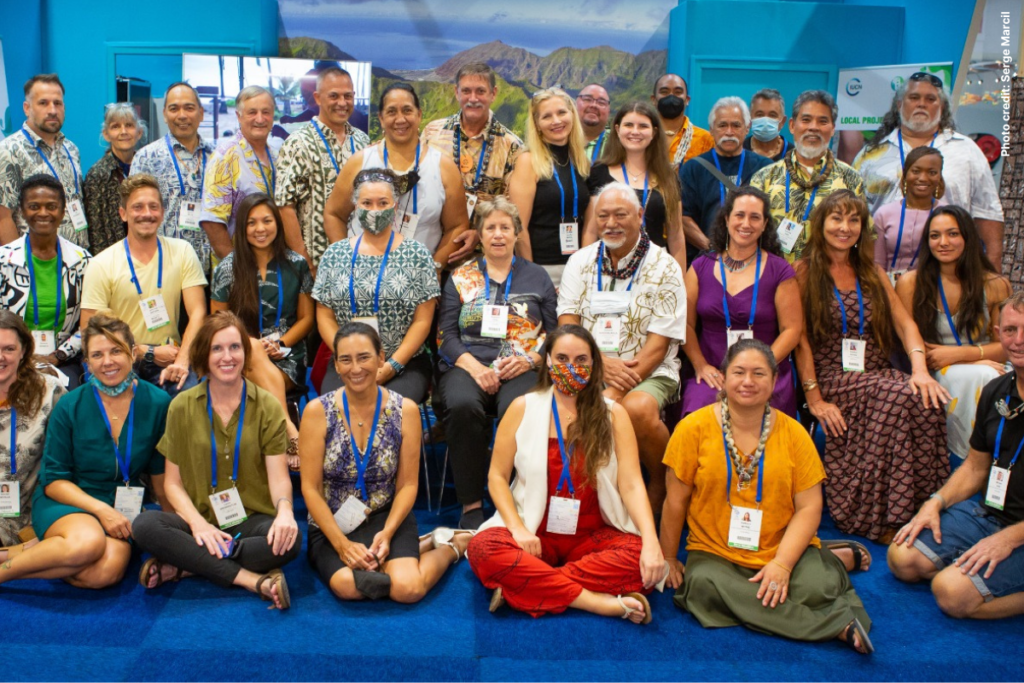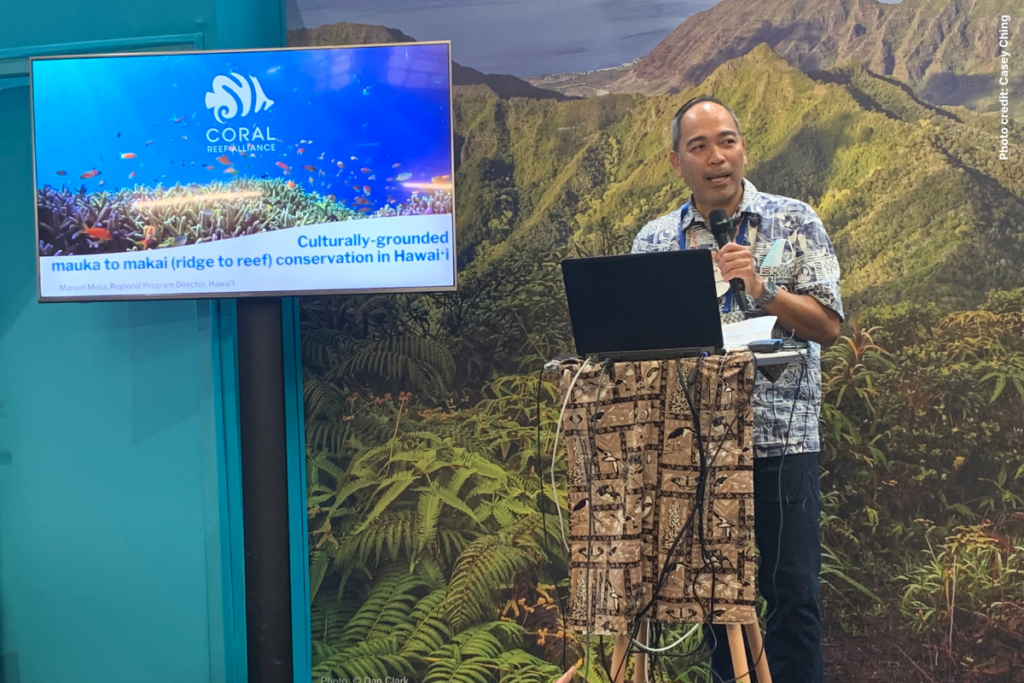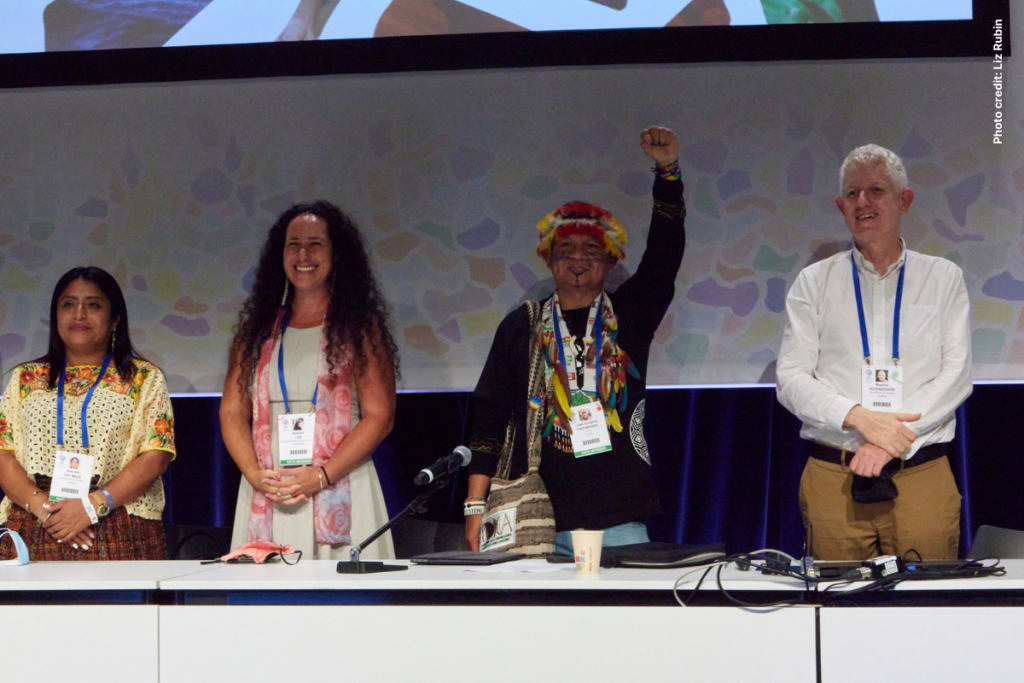From raging wildfires to melting glaciers to coral bleaching—it is clear that there is pressing urgency to face the planet’s climate and ecological emergency. After postponing last year’s event due to COVID-19, the International Union for Conservation of Nature (IUCN) decided to hold its quadrennial World Conservation Congress from September 3 to 11, 2021 and commit to actions that will ensure a more sustainable future.
Members from more than 160 countries in government, science, civil society, and business sectors met in Marseille, France—along with many more participating virtually. One of those attendees was CORAL’s Hawaiʻi Regional Program Director Manuel Mejia, representing the Hawaiʻi Conservation Alliance, an IUCN member organization and previous host to the 2016 World Conservation Congress.

We had a chance to catch up with Mejia after he returned from Marseille, getting a “behind-the-scenes” look at the main highlights and why there are reasons to be optimistic.
More Indigenous Voices
Previously, Mejia attended the 2016 Congress that took place in Honolulu, Hawaiʻi, where a new membership category called the “Indigenous Peoples Organizations” was formed. Since its establishment, Mejia has noticed a significant increase of individuals from the Indigenous Peoples Organizations represented at IUCN.
“Indigenous voices are finally being elevated and listened to,” says Mejia, expressing the importance of taking a biocultural approach to conservation. “In the Pacific, and in Indigenous cultures in general, people are part of the equation. They aren’t separate from nature. As nature thrives, people thrive.”
At the Congress, Mejia proudly represented our partners in Hawaiʻi at the “Pacific Pavilion,” where members living in Oceania and the Pacific Islands spoke about topics relevant to their region.

Mejia gave a presentation and shared the significance of “mauka to makai” conservation approaches in Hawaiʻi, or “ridge to reef.” He explained why taking care of land and sea is an important element to local cultures and island communities, like Hawaiʻi, and how communities are leading conservation efforts guided by Indigenous values and knowledge.
New Steps to Combat Climate Change
Climate change was also an important topic at this year’s event. During the Congress, the Union made great progress by establishing the first official “Climate Change Commission” within IUCN—a motion widely led and supported by members of the Hawaiʻi Delegation, including Mejia.
According to a statement released by IUCN, “A climate crisis commission with a single focus to implement a unified plan to save the earth—providing a venue for those who wish to be part of the final stand—will protect future generations, Indigenous people and nature.” This new establishment will contribute to the worldwide effort to reduce harmful greenhouse gas emissions and adapt to the planet’s changing climate.
This decision was a major victory for the Hawaiʻi delegation, as they feel firsthand the impacts of climate change to the Pacific. “Small islands are the canaries in the coal mine,” says Mejia. “They are the most vulnerable frontliners when it comes to climate change impacts.”
A Call to Action
As a whole, Mejia felt this year’s Congress took an “all hands on deck” approach to conservation—with a strong sense of inclusion, collaboration, and dedication.

From Harrison Ford’s passionate speech to presentations by youth conservationists to the involvement of the Marseille community, people from so many generations, backgrounds, and countries joined forces to seek nature-based solutions. Even French President Emmanuel Macron gave a speech, demonstrating his leadership in tackling climate change and expressing the importance of protecting nature—as our well-being depends on it.
Recent reports and studies all show that there is a dire need for real change. But Mejia is optimistic and sees this as an opportunity to come together and amplify meaningful conservation efforts. In the words of Harrison Ford, “We’ve got to get to work. We’ve got to make things happen—we’ve got to make it happen now.”
